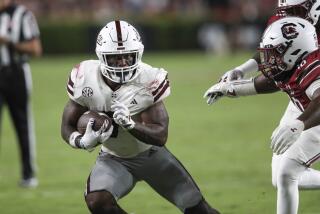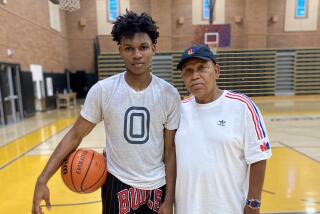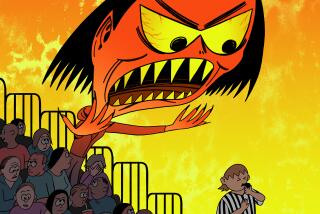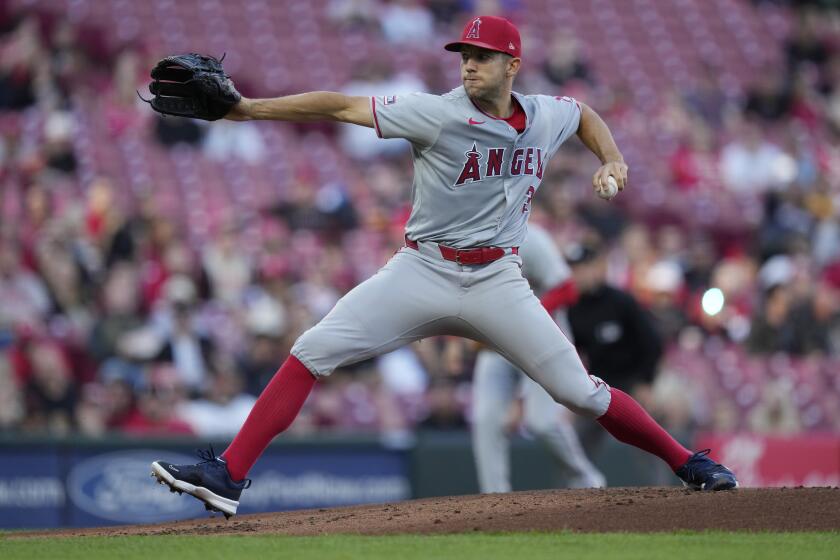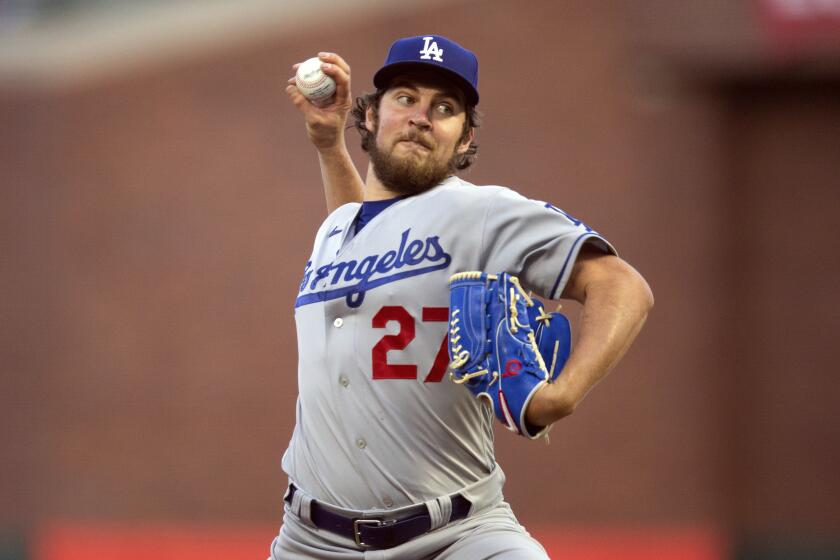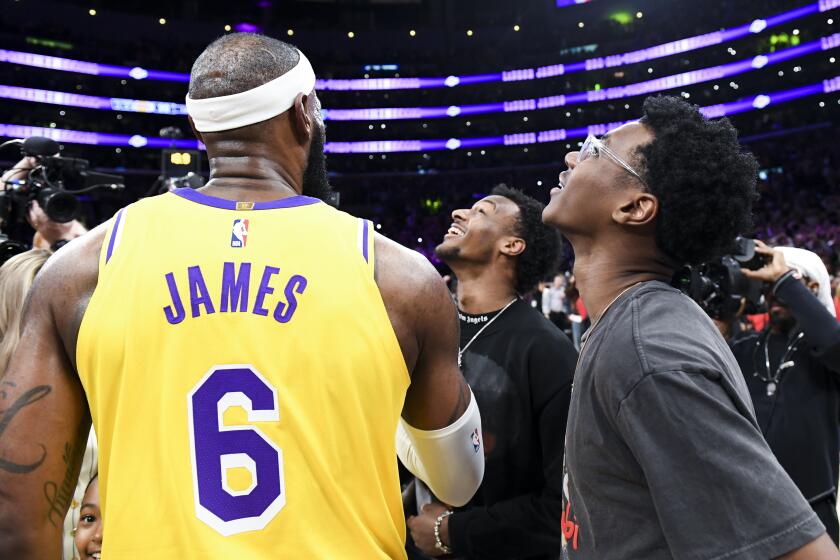Young superhero has a team behind him
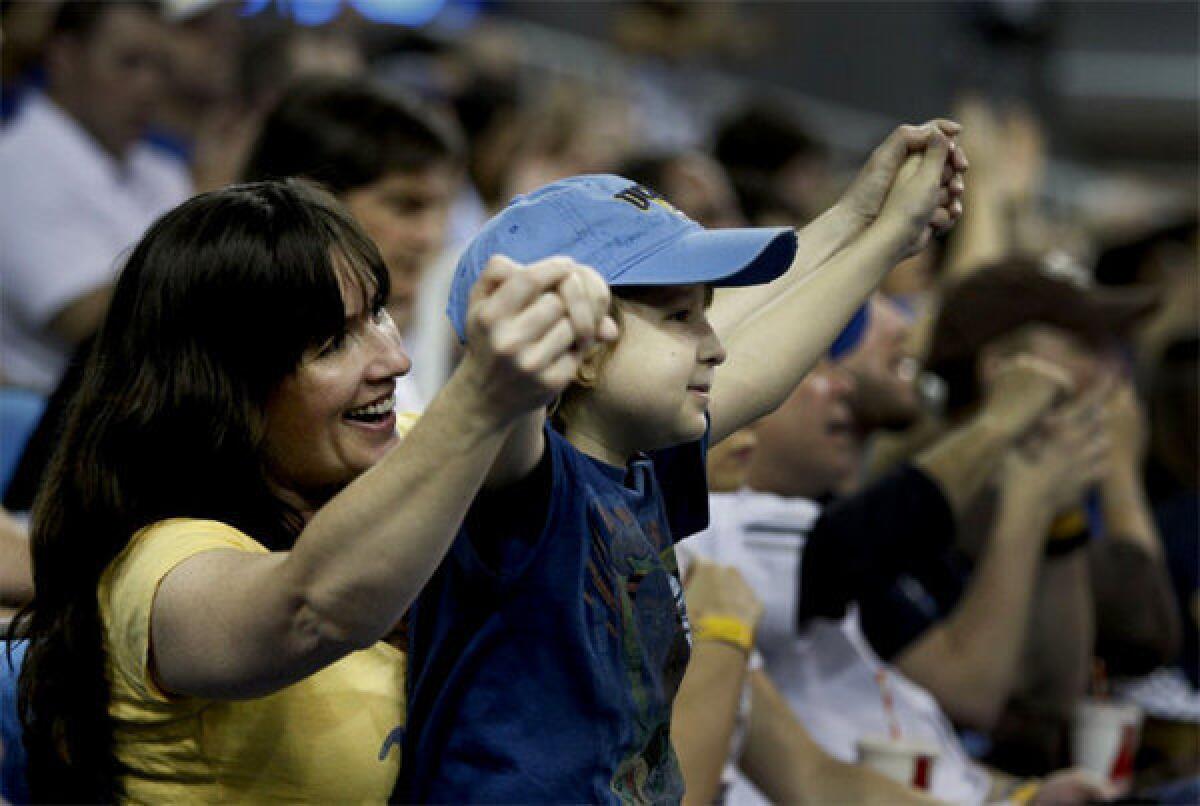
Sounds strange, I know. But I hope you never have reason to meet Dr. Noah Federman, who makes his living saving children’s lives.
Extraordinary guy. Take all the athletes I’ve met in more than 40 years and this is my hero, even though he has to admit, “Some see me coming and it’s a visceral reaction; they put their heads in a trash can and throw up.
“I’m not that ugly,” he protests, and we argue for the next 10 minutes.
I wear a hat with the name of the place where he works to every game as a reminder to athletes how lucky they have it. Most just look at it as a hat.
It might be five years since I last saw Federman.
But I get an email from Jeffrey Hughes. I’ve never heard of Hughes, but he mentions Federman, Ben Howland and John Wooden. And I’m a sucker for anything Wooden.
He mentions another extraordinary human being who happens to be his own son, 9-year-old Jeffrey Jr.
He says Wooden once held a 3-month-old Jeffrey in his arms. “He wouldn’t let go,” Hughes says.
Wooden always did have an eye for talent.
Hughes says Jeffrey Jr. is now Howland’s friend. I didn’t know Howland had friends.
He says Howland has visited with Jeffrey for more than a year, and he says the last time Howland met with his son he told him, “I love you.”
I only know Howland as a screamer who goes through life gritting his teeth and overcoaching. I email Howland to find out if he’s OK.
Howland calls. He starts talking about “the toughest kid he’s ever known,” so I figure we’re discussing Saturday’s game with Arizona.
But he says, “He’s just 9,” and so we’re talking Jeffrey. “You want your players to be tough, but let me tell you about tough. You should meet him.”
So I do. First person I see is Federman, and I don’t like where this is going. The kid, meanwhile, has his head in a throw-up bucket.
My first thought is poor kid, he’s going to have to stay hospitalized and miss Saturday night’s basketball game. Way to go Federman.
Then I meet the kid’s parents. All these years following sports and it’s amazing how the best people are usually parents.
And 14 months ago they were parents just like you.
They have four kids, three of them parked between the ages of 5 and 8 at the time. Jeffrey is the 8-year-old, a third-grader with a stomachache sent to the school nurse.
It’s a Monday; by Thursday they are talking about putting him in the hospital.
“We sense something is really wrong,” says Jeffrey’s dad. “We want one more night with our son so we take him home.”
That night, Mom, Dad and child sleep together.
Friday, life changes. Jeffrey has a cancer so rare there are only a couple of hundred cases known in the country. It has a 20% survival rate. Some stomachache.
“What does 20% mean to a parent?” says UCLA’s Federman. “It means there’s a chance.”
Jeffrey’s father hears the diagnosis, though, and gets mad. He walks out of the hospital, across the street and downs two glasses of vodka before falling to the floor.
Annie, Jeffrey’s mom, remains and listens. She has no idea until now what “sarcoma” means, or DSRCT, which is short for desmoplastic small round cell tumors. But she will.
When she hears the name of a doctor in New York who might help she wants to take her son to the airport.
That was 12 rounds of chemotherapy ago, five weeks of radiation, complications, trips to the emergency room and five operations to remove 14 tumors from their son’s tummy.
There are also too many nights to count, Mom or Dad sleeping on the couch in the hospital, always one of them here.
During this time Annie loses her father to lung cancer.
“There’s so much to do,” Annie says. “I cannot stop to think about all this or I’ll be curled in a ball in the corner of the room shouting, ‘No, no, no.’”
As good news goes, there is “no evaluable disease” detected at this time in Jeffrey’s abdomen. But this cancer is so aggressive that Jeffrey will have to receive chemo treatments once a month for the remainder of his life, or until a better treatment is discovered.
“We know not everyone overcomes cancer,” Jeffrey’s dad says. “Right now there’s a mother holding her 4-year-old son in hospice with the same disease, knowing he’s about to die.
“But why shouldn’t Jeffrey be part of the 20%? He’s our Iron Man.”
They are broke now, but they will find the money to make the $1,000 monthly insurance payment because as Annie says, “You do what you have to do for your child.”
They remain together as a family, the plan to check Jeffrey out of the hospital for a couple of hours to attend the UCLA game with everyone.
Faith is important to them, as is giving their child a good time when possible.
They are seeing a therapist and relying on anyone willing to help as their lives continue to change.
They call it “Jeffrey’s Team,” which includes a masterful surgeon in New York and Federman & Co. at UCLA. “We couldn’t do it without others,” Annie says. “When I need help with our other children, I call another mom and there is always one there.”
Krista Strauss, another team member, organized a “walk for Jeffrey” and a website to raise funds at jeffreyhughes.shutterfly.com.
“When I had my daughter, Jeffrey would snuggle with her, commenting how cute she was while simultaneously being sick to his stomach,” says Lauren Walsh, who home-schooled Jeffrey. “No child should have to endure what he’s been through. But somehow he’s the one who is teaching me the lessons now.”
Jeffrey has scars running all over his abdomen, but it doesn’t stop him from playing with his Skylander Giants.
“When he’s building Star Wars Legos, that’s when we know he’s feeling better,” Annie says.
“He almost never cries, but the other day I noticed tears. He said, ‘I wish could just be a kid who goes to school every day.’”
There’s no hesitation from Annie, bouncing off the couch to climb into her son’s hospital bed while telling the story.
“My job is cheerleader,” she says. “Hey, I learned the Gangnam dance and he laughed. I’ll do back flips if I have to.
“We have our moments too, but never in front of Jeffrey,” she says. “We both started crying when we got a packet in the mail from the Make-A-Wish Foundation. No parent wants to get that packet.”
Jeffrey’s father quickly points out that Make-A-Wish is for kids with life-threatening diseases. “It doesn’t mean they are lost causes,” he says.
The toughest kid you really should meet has decided on a Make-A-Wish Disney cruise, but doesn’t want to go until he can eat.
He hasn’t really eaten since April, a popsicle here and there while being fed through a port in his chest.
“Let me tell you, I need hugs,” says Jeffrey’s father without embarrassment. “My son is injured, and so am I. We know we’re destroying our child, but we have no choice. We have to keep killing the head of the snake or it will come back.”
Annie listens to her husband, but says, “I don’t need hugs. You’re just a mom, and you just do it. Maybe it’s not a normal life, but we have our son. And that’s what is important.”
More to Read
Get our high school sports newsletter
Prep Rally is devoted to the SoCal high school sports experience, bringing you scores, stories and a behind-the-scenes look at what makes prep sports so popular.
You may occasionally receive promotional content from the Los Angeles Times.
